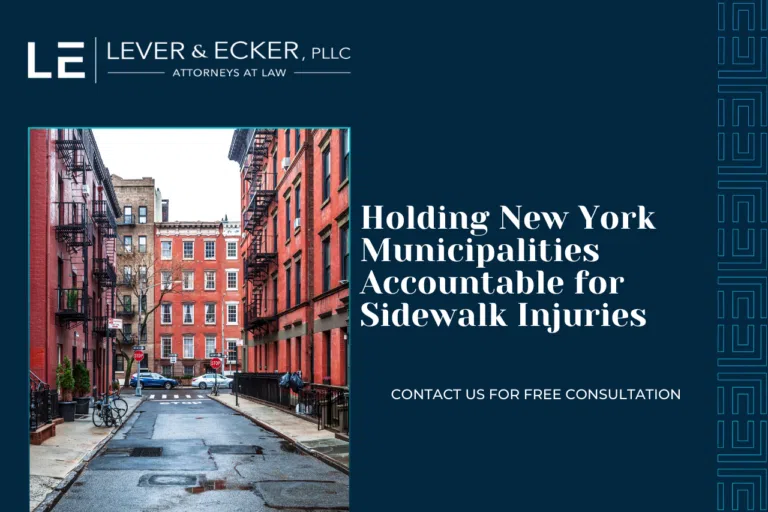When Is a City in New York State Responsible for Sidewalk Repair and Maintenance?
After being injured on a New York sidewalk, you may be able to sue the city (or other municipal entity) if you can prove it was responsible for your fall by failing to keep its sidewalks safe. However, most municipalities in New York have enacted ordinances that specify when property owners are responsible for hazards and injuries on adjacent sidewalks, as opposed to the municipality.
That’s why it’s so important to have an experienced attorney investigate your case to advise as to the applicable governing law . For example, while some ordinances focus on snow and ice on sidewalks, others cover general maintenance, and, as noted above, some place primary responsibility on the abutting landowner rather than the municipality itself.
In all cases, however, you will need evidence to prove liability and damages in your case. This may include things like photographs, videos, documentation regarding sidewalk defects, expert testimony, medical records, documentation of lost income, and personal notes recording your daily pain and suffering. Our skilled legal team can review your case, identify liable parties, gather all available evidence, and support a strong claim on your behalf.
Do You Have a Slip, Trip or Fall Case? Contact Our Team Today
No fees unless we win your case.
When Is New York City Responsible for Sidewalk Maintenance?
In New York City, abutting property owners are generally responsible for maintaining the sidewalks adjacent to their premises in a reasonably safe condition and are liable for injuries caused by their failure to do so. This can include failing to install, construct, reconstruct, repave, repair, or replace defective sidewalk flags, as well as failing to remove snow, ice, dirt, or other material from the sidewalk.
However, this rule does not apply to sidewalks in front of single-family, two-family, or three-family residential properties. If you fell on the sidewalk due to unaddressed hazards in front of these kinds of residential premises, you may be able to sue the city instead.
The City Received Prior Written Notice of the Damaged Sidewalk
In certain municipalities in New York, to bring a sidewalk injury lawsuit against the municipality you must prove that it received prior notice of the sidewalk hazard that caused your injury. A simple phone call or “constructive notice” is not enough—an authorized official must typically receive written notice of the hazard. You must also prove that the city had sufficient time to address the issue and failed to do so.
Injured Individual Submitted a Notice of Intent to File a Claim
If you have been injured on a public sidewalk in New York and plan on suing a municipality, that requires prior written notice, the first step is filing a Notice of Claim. This notice must be delivered to the appropriate government entity within 90 days of the accident. There is also a 30-day waiting period after filing the notice before you can file a lawsuit.
How Long Do You Have to File a Slip, Trip, or Fall Lawsuit Against a City in New York State?
The New York personal injury statute of limitations is normally three years from the date of injury. However, different deadlines apply when filing against a government entity. After filing your Notice of Claim within 90 days, you have one year and 90 days to file a lawsuit against the municipality.
Contact Lever & Ecker’s Slip, Trip, and Fall Attorneys
Suing a government entity is a complex process. Working with an attorney who specializes in slip, trip, and fall cases can ensure that you take the right steps to secure the compensation you deserve. At Lever & Ecker, our award-winning legal team has 75+ years of combined legal experience. Our skilled slip, trip, and fall lawyers take a hands-on approach to every case and have secured millions in high-value case results for our clients.
With offices in White Plains, the Bronx, and Queens, we help injured clients throughout New York State. If you or a loved one were injured in a slip, trip, or fall on a New York sidewalk, we are here to help. Call (914) 288-9191 or contact us online to schedule a free, no-obligation consultation.


